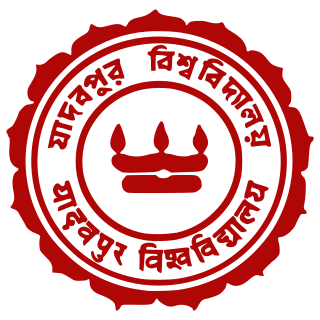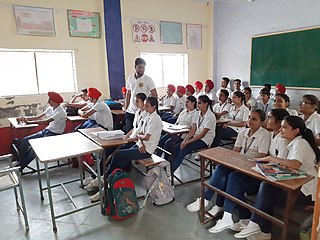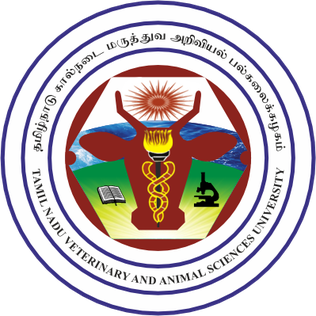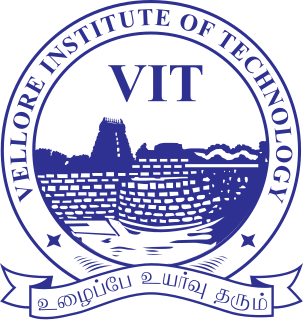
Jadavpur University is a public technical university located in Jadavpur, Kolkata, West Bengal, India. It was established in 1905 as Bengal Technical Institute and was converted into Jadavpur University in 1955. In 2022, it was ranked fourth among universities in India by the National Institutional Ranking Framework (NIRF).

Osmania University is a collegiate public state university located in Hyderabad, Telangana, India. The university was founded by and named after Mir Osman Ali Khan, the 7th Nizam of Hyderabad in 1918. It is the third oldest university in southern India, and the first to be established in the erstwhile Kingdom of Hyderabad. It was the first Indian university to have Urdu as a medium of instruction — but with English as a compulsory subject. As of 2012, the university hosts 3,700 international students from more than 80 nations.

Education in India is primarily managed by state-run public education system, which fall under the command of the government at three levels: central, state and local. Under various articles of the Indian Constitution and the Right of Children to Free and Compulsory Education Act, 2009, free and compulsory education is provided as a fundamental right to children aged 6 to 14. The approximate ratio of public schools to private schools in India is 7:5.

Anna University is a public state university located in Tamil Nadu, India. The main campus is in Chennai. It was originally established on 4 September 1978 and was named after C. N. Annadurai, the former Chief Minister of Tamil Nadu.

Tamil Nadu Veterinary and Animal Sciences University (TANUVAS) is a veterinary university founded in 1989 in Madhavaram Milk Colony, Chennai, India. It is composed of the Madras Veterinary College, Vepery, Veterinary College and Research Institute, Namakkal, Veterinary College and Research Institute, Tirunelveli; Veterinary College and Research Institute, Orathanadu, Thanjavur and the Institute of Food and Dairy Technology, Koduvalli, Chennai-52. Research farms are for leprosy bacteria, for prawn and edible fish culture, and for animal feed safety.

Jamia Millia Islamia is a central university located in New Delhi, India. Originally established at Aligarh, United Provinces during the British Raj in 1920, it moved to its current location in Okhla in 1935. It was given the deemed status by University Grants Commission in 1962. On 26 December 1988, it became a central university.
Deemed university, or deemed-to-be-university, is an accreditation granted to higher educational institutions in India by the Department of Higher Education. To quote the Ministry of Education (MOE), "An Institution of Higher Education, other than universities, working at a very high standard in specific area of study, can be declared by the Central Government on the advice of the University Grants Commission (UGC), as an Institution 'Deemed-to-be-university'. Institutions that are 'deemed-to-be-university' enjoy the academic status and privileges of a university."

The University of Delhi, informally known as Delhi University (DU), is a collegiate, public, central university located in New Delhi, India. It was founded in 1922 by an Act of the Central Legislative Assembly and is recognized as an Institute of Eminence (IoE) by the University Grants Commission (UGC). As a collegiate university, its main functions are divided between the academic departments of the university and constituent colleges. Consisting of three colleges, two faculties, and 750 students at its founding, the University of Delhi has since become India's largest institution of higher learning and among the largest in the world. The university has 16 faculties and 86 departments distributed across its North and South campuses. It has 77 constituent colleges and five other institutes. The Vice President of India serves as the university chancellor.

The University Grants Commission (UGC) is a statutory body set up by the Department of Higher Education, Ministry of Education, Government of India in accordance to the UGC Act 1956 and is charged with coordination, determination and maintenance of standards of higher education in India. It provides recognition to universities in India, and disbursements of funds to such recognized universities and colleges. The headquarters are in New Delhi, and it has six regional centres in Pune, Bhopal, Kolkata, Hyderabad, Guwahati and Bangalore. A proposal to replace it with another new regulatory body called HECI is under consideration by the Government of India. The UGC provides doctoral scholarships to all those who clear JRF in the National Eligibility Test. On an average, each year ₹725 crore (US$95 million) is spent on doctoral and post-doctoral fellowships by the commission.

Vellore Institute of Technology (VIT) is a private deemed university located in Katpadi in Vellore, India. Founded in 1984 as Vellore Engineering College by G. Viswanathan, the institution offers 64 Undergraduate, 35 Postgraduate, 16 Integrated, 2 Research and 2 M.Tech Industrial Programmes. It has campuses in Vellore and Chennai and sister universities in Amaravati and Bhopal.

The All India Council for Technical Education (AICTE) is a statutory body, and a national-level council for technical education, under the Department of Higher Education. Established in November 1945 first as an advisory body and later on in 1987 given statutory status by an Act of Parliament, AICTE is responsible for proper planning and coordinated development of the technical education and management education system in India.

The Annamalai University is a public state university in Chidambaram, Tamil Nadu, India. The 950-acre (3.8 km2) sprawling campus offers courses of higher education in arts, science, engineering, medical, management, humanities, agriculture, and physical education. The university also provides more than 500 courses through distance education. With over 32,480 students residing on campus, it is one of the largest unitary, teaching, and residential universities in Asia, and is among one of the most reputed and ranked universities in India including the rankings from NIRF, QS World University Rankings, Times University Rankings, CWTS Leiden Ranking.

Indira Gandhi National Open University, known as IGNOU, is a Central Open Learning University located at Maidan Garhi, New Delhi, India. Named after former Prime Minister of India Indira Gandhi, the university was established in 1985 with a budget of ₹20 million, after the Parliament of India passed the Indira Gandhi National Open University Act, 1985. IGNOU is run by the central government of India, and with total active enrollment of over 3 million students, it is the largest university in the world.

Lovely Professional University (LPU) is a private university located in Chaheru, Phagwara, Punjab, India. The university was established in 2005 by Lovely International Trust, under The Lovely Professional University Act, 2005 and started operation in 2006.

South Asia is the southern region of Asia, which is defined in both geographical and ethno-cultural terms. The region consists of the countries of Afghanistan, Bangladesh, Bhutan, India, Maldives, Nepal, Pakistan, and Sri Lanka. Topographically, it is dominated by the Indian Plate and defined largely by the Indian Ocean on the south, and the Himalayas, Karakoram, and Pamir mountains on the north. The Amu Darya, which rises north of the Hindu Kush, forms part of the northwestern border. On land (clockwise), South Asia is bounded by Western Asia, Central Asia, East Asia, and Southeast Asia.
The Indian Institutes of Technology (IITs) are central government owned public technical institutes located across India. They are under the ownership of Ministry of Education, Government of India. They are governed by the Institutes of Technology Act, 1961, which has declared them as Institutes of National Importance and lays down their powers, duties, and framework for governance as the country's premier institutions in the field of Technology. The Institutes of Technology Act, 1961 currently lists twenty-three IITs. Each IIT is autonomous, linked to the others through a common council, which oversees their administration. The Minister of Education,India is the ex officio Chairperson of the IIT Council. As of 2021, the total number of seats for undergraduate programs in all IITs is 16,234.

The Ministry of Education is a ministry of the Government of India, responsible for the implementation of the National Policy on Education. The Ministry is further divided into two departments: the Department of School Education and Literacy, which deals with primary, secondary and higher secondary education, adult education and literacy, and the Department of Higher Education, which deals with university level education, technical education, scholarships, etc.

India has a publicly funded higher education system that is the third largest in the world, next to the United States and China. The main governing body at the tertiary level is the University Grants Commission, which enforces its standards, advises the government, and helps coordinate between the centre and the state. Accreditation for higher learning is overseen by 15 autonomous institutions established by the University Grants Commission (UGC).

The National Institutional Ranking Framework (NIRF) is a methodology adopted by the Ministry of Education, Government of India, to rank institutions of higher education in India. The Framework was approved by the MHRD and launched by Minister of Human Resource Development on 29 September 2015. Depending on their areas of operation, institutions have been ranked under 11 different categories – overall, university, colleges, engineering, management, pharmacy, law, medical, architecture, dental and research. The Framework uses several parameters for ranking purposes like resources, research, and stakeholder perception. These parameters have been grouped into five clusters and these clusters were assigned certain weightages. The weightages depend on the type of institution. About 3500 institutions voluntarily participated in the first round of rankings.
















